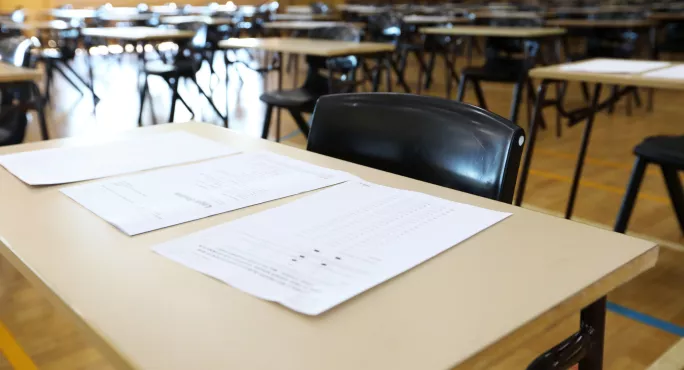- Home
- GCSE resits: How can you run a Covid-safe exam for 500?
GCSE resits: How can you run a Covid-safe exam for 500?

There seems to be this firm belief in government that the number of students sitting their GCSEs next week will be low. Low enough, in fact, to allow for a safe exam diet for students, staff and the wider community.
In some ways, ministers could be forgiven for coming to that conclusion. After all, Ofqual released figures earlier this month showing that, in total, there had been 20,100 provisional entries for the autumn A-level series, equivalent to 3 per cent of entries in the summer. GCSE entries in schools could also be lower than the usual summer entry numbers.
And I, for one, of course, would like people to be safe, and I hope it will indeed be possible to hold next week's exams in a safe way. But one thing we already know is that the government will be wrong about this being an exam series of low numbers. Instead, it already smells like yet another situation when the college sector was not a prime consideration.
According to the Association of Colleges, there will be around 20 colleges where over 500 candidates will sit their English and maths exam next week, while a number of others will see hundreds of learners. Attending a virtual college visit with apprenticeships and skills minister Gillian Keegan last week, I heard City College Norwich principal Corrienne Peasgood talk about the 800 candidates it will have to accommodate – despite having written to each student to try and discourage them from taking this resit opportunity.
GCSE November resits: 20 colleges will see cohorts of over 500
Association of Colleges: November exams 'pose public health risk'
GCSEs: Why we should hold a second exam series in July
The logistical implications of this are significant. While in the past, the college has taken its resit students to a larger venue for the exam, that has not been possible in a Covid-safe way this year. Instead, classes at the Norwich campus will be moved online so that space can be found for a socially distanced exam with record numbers.
Coronavirus: Is it safe to run GCSE resits in colleges?
It is one example of an issue that will be mirrored across the country – with colleges having to move classes online and find additional rooms to accommodate candidates in a way that is sufficiently spaced out. That will, inevitably, cost an already cash-strapped sector. It will require additional invigilators, socially distanced transport and possibly even marshals or other support staff to ensure learners don’t put themselves and others at risk while waiting to begin or leave the exam.
On top of a logistical issue, this is, of course, also a health issue. While care can be taken to space students out in the exam hall, there is no taking away from the basic facts of this exercise: exam day will bring together literally hundreds of students who do not commonly share a college bubble – some may not even be at college any more and are merely returning for their resit. They will include part-time students who also spend time in workplaces, people with care responsibilities, students who live with older relatives, and learners of all ages – even if the majority are likely to be younger. There will be little chance of a college controlling their behaviour as they arrive or after their exam.
I am not surprised Corrienne Peasgood is concerned for the health of her learners. At the time of the virtual visit, the college had 300 students self-isolating. That was before hundreds of them sat an exam together. And it was in Norwich – a current tier 1 area.
It might, of course, all go without a hitch. Colleges will jump through every possible hoop, and students, I hope, will do their utmost to observe the rules. So that could happen. But just imagine if that is not the case. What if there is an outbreak? If students or staff do get sick because it turns out that running Covid-safe exams for hundreds of students at this stage of the pandemic simply is not possible?
And so, as we are left with only days until the exam, I cannot help but be quite seriously concerned. Concerned because of the pressure on colleges to run these exams in a way that is safe and gives the students the best possible chance of success. Concerned, too, that there will be larger college outbreaks.
But also, to be frank, concerned that the sector has ended up in this position, once again, because those in charge did not consider the realities of GCSE resits in colleges when they decided on this autumn exam series. That once again, FE was an afterthought, and not at the core of everyone's thinking.
Keep reading for just £1 per month
You've reached your limit of free articles this month. Subscribe for £1 per month for three months and get:
- Unlimited access to all Tes magazine content
- Exclusive subscriber-only stories
- Award-winning email newsletters



